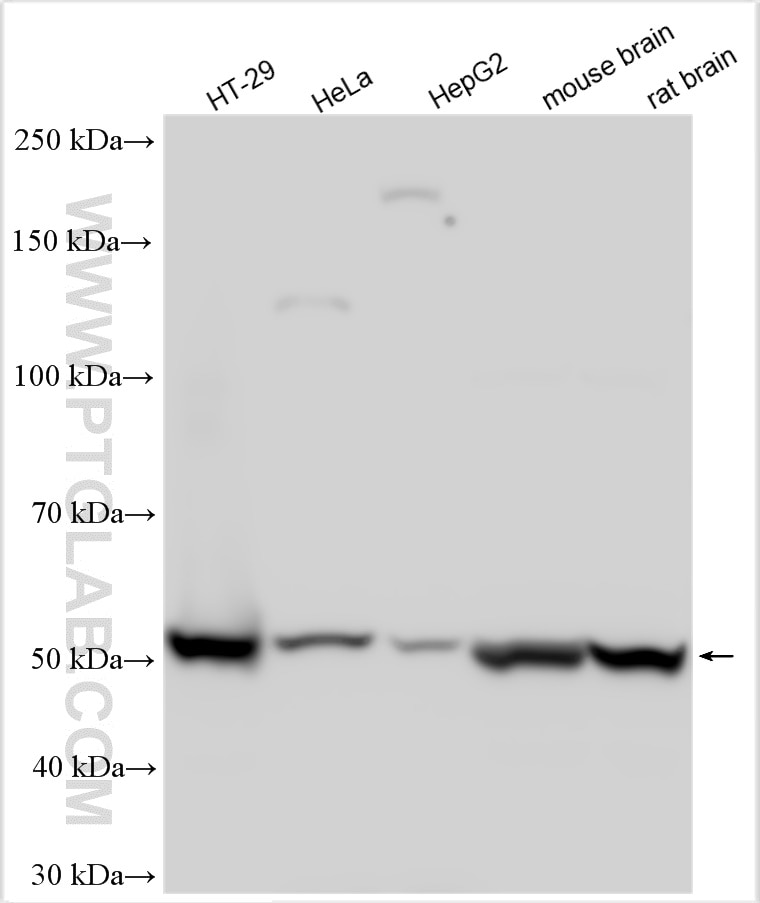Anticorps Polyclonal de lapin anti-LPCAT4
LPCAT4 Polyclonal Antibody for WB, ELISA
Hôte / Isotype
Lapin / IgG
Réactivité testée
Humain, rat, souris
Applications
WB, ELISA
Conjugaison
Non conjugué
N° de cat : 17905-1-AP
Synonymes
Galerie de données de validation
Applications testées
| Résultats positifs en WB | cellules HT-29, cellules HeLa, cellules HepG2, tissu cérébral de rat, tissu cérébral de souris |
Dilution recommandée
| Application | Dilution |
|---|---|
| Western Blot (WB) | WB : 1:1000-1:4000 |
| It is recommended that this reagent should be titrated in each testing system to obtain optimal results. | |
| Sample-dependent, check data in validation data gallery | |
Applications publiées
| WB | See 5 publications below |
Informations sur le produit
17905-1-AP cible LPCAT4 dans les applications de WB, ELISA et montre une réactivité avec des échantillons Humain, rat, souris
| Réactivité | Humain, rat, souris |
| Réactivité citée | Humain, souris |
| Hôte / Isotype | Lapin / IgG |
| Clonalité | Polyclonal |
| Type | Anticorps |
| Immunogène | LPCAT4 Protéine recombinante Ag12281 |
| Nom complet | lysophosphatidylcholine acyltransferase 4 |
| Masse moléculaire calculée | 524 aa, 57 kDa |
| Poids moléculaire observé | 50-57 kDa |
| Numéro d’acquisition GenBank | BC092463 |
| Symbole du gène | LPCAT4 |
| Identification du gène (NCBI) | 254531 |
| Conjugaison | Non conjugué |
| Forme | Liquide |
| Méthode de purification | Purification par affinité contre l'antigène |
| Tampon de stockage | PBS avec azoture de sodium à 0,02 % et glycérol à 50 % pH 7,3 |
| Conditions de stockage | Stocker à -20°C. Stable pendant un an après l'expédition. L'aliquotage n'est pas nécessaire pour le stockage à -20oC Les 20ul contiennent 0,1% de BSA. |
Protocole
| Product Specific Protocols | |
|---|---|
| WB protocol for LPCAT4 antibody 17905-1-AP | Download protocol |
| Standard Protocols | |
|---|---|
| Click here to view our Standard Protocols |
Publications
| Species | Application | Title |
|---|---|---|
J Hepatol Lysophosphatidylcholine acyltransferase 1 altered phospholipid composition and regulated hepatoma progression. | ||
Neurochem Res iPLA2β Knockout Mouse, a Genetic Model for Progressive Human Motor Disorders, Develops Age-Related Neuropathology. | ||
FASEB J Deep multilayer brain omics identifies the potential involvement of menopause molecular networks in Gliomas' disease progression | ||
Front Biosci (Landmark Ed) Upregulation of LPGAT1 Enhances Lung Adenocarcinoma Proliferation | ||
FASEB J Overexpression of lysophospholipid acyltransferase, LPLAT10/LPCAT4/LPEAT2, in the mouse liver increases glucose-stimulated insulin secretion |


